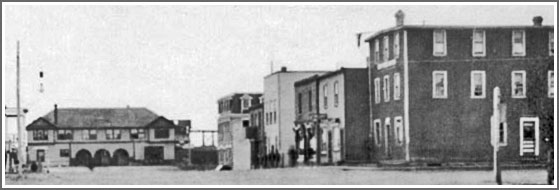|
Murder
and Mayhem at the Cecil House
Rivers was still a very new town when it became the centre of a murder
investigation and trial.
In late 1911, the effects of the ongoing strike by Grand Trunk Pacific
employees was having its effect on the community of Rivers and tensions
were running high. Arthur Alsford was a former boilermaker’s helper at
the GTP shops in Rivers, qho now worked as a night porter at the Cecil
Hotel on Main Street.
On the morning of December 20th, he and Jack Gribben, a striker met Alf
Smith going out the door.
According to Mr. Gibben’s testimony, he asked Mr. Smith if he was
working at the shops and when the answer was “yes” he asked if he was
aware that he was “scabbing”. At that point Smith pulled out a gun and
when Gibben and Mr. Aldsord tried to take it away from him, shots were
fired. Gibben sustained two serious wounds and Aldford was fatally
shot.
His testimony was somewhat corroborated by the bartender, Mr. Ving who
recalled that he had heard someone say something like “He’s got a gun”
or, “Get that gun.” before shots were fired.
The trial was held in the spring of 1912, just after Gibbens was
released from the hospital where he hade been recovering from his
wounds.
The prosecution contended that Mr. Smith without serious provocation
began firing a revolver. Mr. Smith claimed that he was attacked
and had used his weapon to defend himself.
The prosecution’s case relied heavily on testimony of strikers and
those admittedly sympathetic to the strikers.
Mr. Gribben insisted under oath that they had not attacked Mr. Smith
before he had produced a gun, and that they were trying to merely get
the gun away from him when shots were fired and Mr. Alston was mortally
wounded.
But Gribben was revealed to be something of a rover, who at some times
worked under an assumed name. The accusation was that he was an
“agitator”. He did admit to knowing ahead of time that Smith was a
strikebreaker and to wanting to confront him after noticing him in the
bar. He admitted to wrestling him to the ground and kicking him,
but insisted that all this happened after the gun was produced.
Mr. Gibben admitted that he had been part of a group that did harass
some strikebreakers but denied that Alston was any harder on
strikebreakers than anyone else, just sympathetic to the strikers.
Tim Slattery, another union member, testified that when he came on the
scene Smith was being held down by Gibben and Leary while Alston lay
helpless and wounded. Dr. Schwann, who had been called to the scene,
recalled that when he arrived the prisoner was being held down and that
he observed severe bruises on his head.
Other witnesses such as Police Constable Conrad Matthews, testified
that Smith was well acquainted with revolvers such as the Smith and
Wesson 32 caliber pistol he had, and that he wouldn’t have fired it
accidentally.

The Cecil
House, on the right in this photo was the site of the altercation that
ended in the death of Arthur Alsford.
In his summation to the jury Prosecutor, Matheson reminded them that
although Gibben had no right to accost Smith and question him, if Smith
pulled a gun we must assume he was responsible for Alston’s death.
Despite provocation, went his argument; Smith had no right to shoot. He
said, “It is permissible in Texas, Colorado or Virginia, but not in
Manitoba.”
In the end, the jury was unable to conclude that he had intended to
commit murder and acquitted him, but the locals, especially union
members, were not convinced. When Smith laid charges against Gribben
and three other men in connection with the hotel incident, that case
was dismissed
|